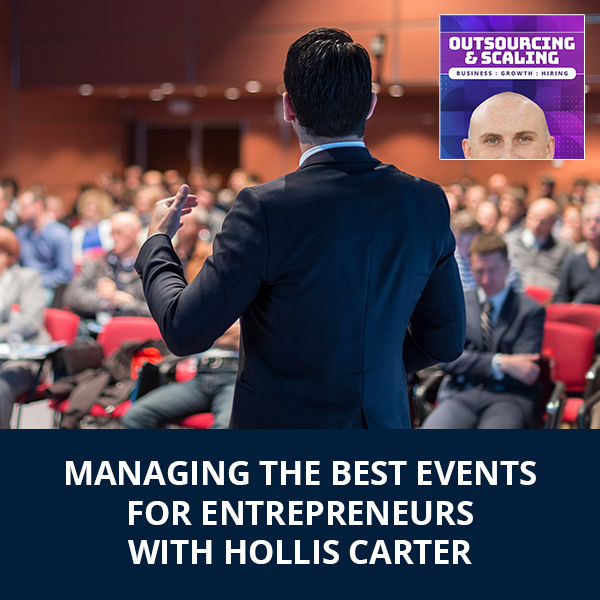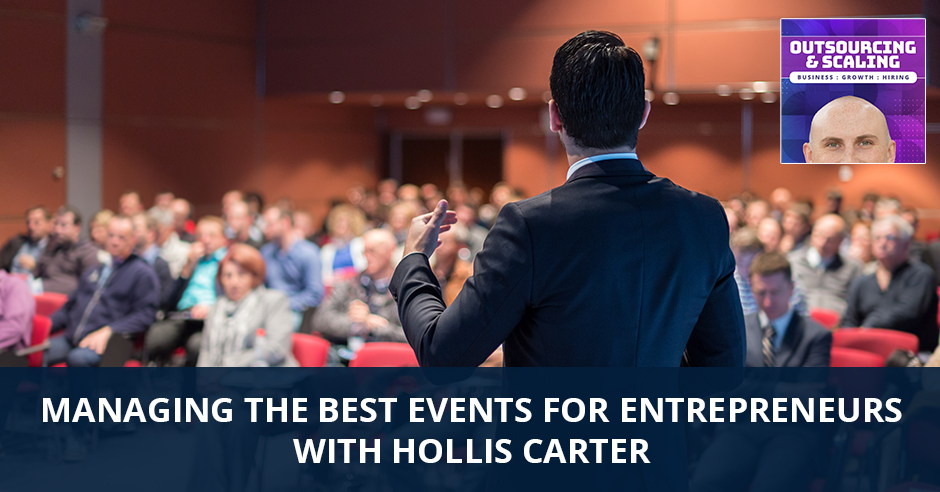


When entrepreneurs reach a certain level of success and have made it in a humble way, they know what they need to get the most value. In this episode, Hollis Carter, the Co-Founder of The Baby Bathwater Institute, reveals what exactly entrepreneurs want when they go to events. He shares strategies on how to combine the best people with the best content to make an awesome event that is far from being a “conference.” Hollis also touches on his learning challenges, early entrepreneurial ventures, his hiring process, and his methods for forging lasting business and personal relationships.
—
Listen to the podcast here:
[smart_track_player url=”https://www.podetize.com/statsapi/www.podetize.com/wp-content/uploads/fileuploads/11-5b145ef137b51b3d1af0633e9305c43d/10/2019/9045b2883f788f9be98a481e16fca5e7.mp3″ title=”Managing The Best Events For Entrepreneurs with Hollis Carter ” artist=”Nathan Hirsch” image=”https://freeup.net/wp-content/uploads/2019/04/OAS.png” ]
Download the audio file here.
Managing The Best Events For Entrepreneurs with Hollis Carter
My guest is Hollis Carter. Hollis, how are you doing?
I’m doing wonderful. How are you?
I am doing great. This is perfect timing. We are heading to Croatia for Baby Bathwater. It’s my first experience. I’ve heard nothing but good things. For those of you who don’t know, Hollis is a serial entrepreneur and avid skier. He started his entrepreneurial journey in the early 2000s, founding multiple companies including a Software as a Service company that he built into a seven-figure virtual business in less than a year. In 2013, he became the founding investor in Utah’s Powder Mountain Ski Resort which develops real estate and hosts events. His experiences and observations led him to cofounding the Baby Bathwater Institute which we’ll talk about. It’s a unique membership-based community from varieties of some of the world’s leading minds and entrepreneurs with a focus on cultivating natural mutually beneficial relationships. Before we talk about that, let’s take a gigantic step back. What were you like growing up? Were you a straight-A student? Were you a rebel? I know you graduated college. Tell us a little about that.
I was pretty much the opposite of the straight-A good student guy. It was third grade when I got the first tap on the shoulder. You only need to do the odd problems. Here’s a laptop and no one had laptops, because they couldn’t read my handwriting. I was a dyslexic, AVB mess. I started skipping school all the time to go fishing and doing stuff. I was not a school guy, but I was a driven kid. If it had something to do about authority or structure, I always zagged the other way. I enjoyed that. I started my first business and it was generating revenue that I could feed myself and do what I want right before I got my driver’s license. It was cool. Suddenly I have people in the direct response world and that was pre-internet.
My dad gave me a lawnmower and the J Abraham little yellow book on marketing that had a bunch of letters that roofing companies had written to get reoccurring billings for roof maintenance. I re-wrote those letters for mow, edge and blow in Georgia, like blow your leaves, trim the yard and do the whole thing. I had 30 lawns on reoccurring billings almost instantly there. I had to learn how to manage teams before I was doing it myself. It was super funny then, I was like, “I’m selling these people plants throughout the house.” I started growing the plants I was selling. Selling those, I had a ton of entrepreneurial ventures pre-internet time as a kid to pave the way for myself. My brother was good at school while I had massive resistance to it. They were like, “You should probably figure out a way in the world that doesn’t work in the normal system for yourself.” I wanted to be outside. I always felt I would be valuable and it didn’t have anything to do with taking tests.
We were talking before that you use virtual teams for over ten years. Was that with the software company?
When you are getting too much in a lane of the work, always go to an outsourcing site and try to get someone to do it.
We had a handful of things and the software was one. A guy put it in the bio because it was something people understand. We also had info products. There was a rafting guy that got hurt and I googled how to make money on the internet and that put me in a crazy rabbit hole. I learned affiliate marketing, launches and I was helping conference. We did everything while we learned how traffic worked, how conversion and products worked. The whole time we always had a mindset. I read something somewhere I can’t recall, “When you learn too much of a hard skill, you get stuck doing that versus growing a company.” Whenever it felt like I was getting too much in a lane of the work, I always go to an outsourcing site or something and try to get someone to do it. Once I knew it was enough to hire it out, we do it so we can keep moving.
Even when we run a software company, I never learned to code. When we were making info products, I never did go too deep into it. We frame it out and hire those things out. In the software company, we had about 26 full-time programmers in India that we hired off. It was pre-Elance. It was great. We actually ended up going to India after we had built it up, to meet them and move them from the big city to a smaller place out in the mountains where they would be less distracted. It was a lot of fun.
What was it like hiring and working with developers? I have a small dev team. For me, it’s a struggle. I’m a business-minded guy and I’m a logical guy that the communication gaps, sometimes they exist there. Where did you learn working with that big of a dev team?
I am very fortunate to have my partner who hated doing the sales and marketing stuff that I liked. I did more of that and the ideation of what those people would do. He was more of the manager of them, but honestly, it was two guys not even in their twenties yet doing all of this. We did everything together. The biggest that we learned is programmers are programmed to program. They’re not going to think, so learning how to make very detailed instructions to make the most of our time and not go back and forth with corrections was a big deal. The biggest win happened when one of the developers showed some creative thought which was interesting. It was the first time we got something back that wasn’t exactly what we said. It was nothing more nothing less. It was like, “I had this idea.” I’m like, “You had an original thought outside of the task we gave you.” Maybe that person was a manager of the rest of the developers and that helped immensely. It provided some time and pay for that person to help them to learn managerial stuff to communicate and speed up the process of the developments.
What other remote people did you hire before besides developers?
Everything customer service. My partner and I got offered to do a small side project. We need writers doing that. Probably every position, the CFO, you name it, we had that as a virtual team. When I was in my teens and twenties running these businesses, I either was traveling the whole time, I was living in my van and I was doing whatever. There was no need to have a physical location. I was very adamant in the digital nomad thing and trying not to get too strapped down with that. Almost every position you would need in a company, we did that.
What do you look for when you’re hiring someone?

Now that we see people in person in the events business, it’s very cultural. The biggest thing we learned is doing the tests, “Do people go above and beyond? Do people think?” This goes back to the programmers are programmed to program. It’s the biggest opportunity cost in frustrations when people did exactly what you said and didn’t think about it or did a little less. We moved to a model and I still do this. We never hire anyone until we did a test. The test purposely has a goal and a project that is vague enough that you have to see if they actually read deeper. Even if we do the application it’s normally a long ad about the job, but the ends are, “Do not send me anything related to this job. Only send me how many spelling errors are in this ad.” That’s to see if they read the ad. I did it on purposely placed a bunch of spelling errors, I don’t even know how many are in it. It was to see if they wrote the subject title and the number versus sending me their normal resume and to see if they’re on autopilot mode.
Let’s fast forward ahead. You’re running all these businesses, what made you think of Baby Bathwater and can you explain the name to our readers? Whenever I tell people, “I’m going to Baby Bathwater Island in Croatia,” they always ask, “Why is it called Baby Bathwater?”
The origin of the idea of the business came up as the name did. This was not an intentional business. This came out of scratching our own niche and accidentally organically kept growing based on the people who came loving what was going on and I’m referring to friends. Over a decade I was running virtual businesses, but honestly our biggest hockey stick growth curves always happened when I attended events whether they were terrible or they were awesome. I always met one of two great people and that was always my goal. One or two people who I can build a relationship with where I have something to offer for them or they have something to offer me and we can combine forces in some way. Whether it is a simple affiliate thing or a partnership, there are a lot of options.
In that same period, my business partner, Baby Bathwater, he is a bit older than me with a little more season. He helped me avoid some pitfalls that my young and overly optimistic mind was getting into and he would see it. We actually became drinking buddies at these conferences we’ve been. We both have the same resistance like, “I don’t want to watch these talks that I could watch on YouTube. Let’s go to the lobby and talk to the people who want to have conversations.” I learn more from sharing stories of what worked and what didn’t. I always learn the best from people’s failures.
That was always the question I was asking, “What doesn’t work right now? What didn’t work?” I learned more from that. From their secret system into success or whatever guru stuff was going on. We did develop a vernacular where, “How was that event?” “There was some baby, but it was mostly bathwater.” Over time we would speed talk to that. Whether the bathwater is, they’re pitching in the back of the room. The talks didn’t have any value. The baby was always the good people that we meet, connections we made and the perspective that was shifted or the fun time we had. It was years ago when we voted to either exit our business or running them and we both moved to the same town, here in Boulder, Colorado. We were having drinks and dinners regularly trying to figure out what our next step was.
We always liked socializing and we got good feedback, so we threw a party years ago. We put our money up and invited a bunch of people and they said, “That was great.” Our intention was to get a business idea and bet some ideas we had and oddly what we ended up doing was more of the hosting part. When I invested in Powder Mountain, it had this great venue that was awesome for these events so we’re doing them there. It grew from 50 to 125 to 150 people. We never did any marketing. It was all, “This guy thought he knew some good culture fit people and he invited some friends.”
Always learn the best from people’s failures.
One of the keys for us was not turning it into a conference. We focused on the curation of personalities of a wide variety of skillset. We are not niche when it comes to industry. We have lots of industries and wide variety of skillset where it’s niched, their business ethics and philosophies in how they do it. They’re not starting for the first time or they’re not an entrepreneur in a big corporation. They’re starting on something they are passionate about. None of us are MBAs but our businesses are growing and scaling and it’s a conversation like, “The problems I had to get going and not the problems I had to scale.” There are so many events for the professional speaker, coach or guru. This is more for the not recognizable face, but crushing it and doing a great job, but also humble and telling you what’s not working too because they’re behind the scenes. They figure out how to turn the levers and wear a million hats and enjoy having a conversation with peers about the journey everybody is on.
People know conferences, they know masterminds and they know networking events and obviously parties. Where does it fall into that? Can you give people a little glimpse behind the scene of what they can expect when they attend one of your events? I’m telling you because I want to know what to expect when I attend.
I would say it’s more of a stew of all those things. It goes back to both Michael and I hating too much structure and being told what to do. When people reach a certain level of success and have done it in a humble way, they know what they need to get the most value. We offer all of the things that you’ve listed. There are parties and masterminds. Whether there is content, there’s talk as well. There are all these things. We’re here to set the setting. We’re not the teachers or the gurus. We don’t bring in specific guys to teach a system. That’s more of peer sharing. The elements that make it work are we always go outside of the normal location. Obviously, renting an island in Croatia is a different setting to a hotel in Atlanta. The key is that no other folks are present who are not part of this curated group.
Michael and I talk to every person on the phone, met them in person or they came in through referral so we know where they’re at in their journey. They’re humble enough of what’s not working, share what is working and do all that. They’re not going to show up with a name tag and a workbook, but you’re going to have a buffet of things you could do. What’s nice on the island is there are three different stages going and fifty-six talks in the five days you’re there, but they’re not one individual preaching to a choir. That’s three or four people in a panel having a curated discussion. There are 200 people there, probably 30 or 40 in each session because we tell people to only go visit the big pain point for you, for subjects we are talking about or you have a lot to offer. If not, spend that time chatting with other people.
It’s such a unique thing to have people who are playing in the same world and a variety of network and perspective. Don’t squander that time sitting and listening to the talk. Only go for what matters. We can’t tell people not to go to talks which is funny. For most of it, it’s hustling in with the cowbell in the hotel room. We want them to go when it’s relevant and be a part of a peer to peer conversation. If not, we want them to dive in and have a good time. Our culture is a little bit of not taking it so seriously, which is a big part of the name being cheeky and funny. There are people with charities, changing the world, doing good things and good businesses, but at the end of the day we want to have a normal human to human conversation and that’s why we have lots of partying and fun. People can go sailing, go to a yoga class, go work out or stay up until the sunrise watching live music having wine and booze all night. It’s pick your poison and find out how it works, dive in with folks and have a human to human conversation.
You are renting an Island. You’re getting all of these entrepreneurs all over the world in one place. I have to imagine a lot of working and time goes into planning and executing that.
That’s funny because someone told me, “You should show the work more to get people engaged.” We’re so busy doing it. The amount of effort that goes into this, it’s something I would do that work even if I wasn’t getting paid for it. I like the event’s production side and doing it. It’s an extension guiding lifestyle. Going to crazy places, it’s like these secret missions. I love that the venues tell us that we’re like a SWAT Team. You come in and take a place that normally couldn’t be a high-end hosting environment and turn it into one. It’s part of transforming the environment.

The Croatia one is interesting. Most of our events, there are shuttles and all these different things that take a lot of our time during the events. What I love about the island is we do more work that’s probably 10x the amount of work to make it happen with customs and this and that and all the different stuff leading up to it. Once we get there, no one’s leaving. It’s all set up like a game that you drop into and people can play. There’s request in different things, but it’s events and I work. I love it. I got done meeting with a bunch of other people like Jayson Gaignard from Mastermind Talks, and other people who are doing events. It was clear to me. Our level of attention to more of the experience and the hosting part is what we like because we had an over-bloated team for it, but I love it. We want to deliver on that and we’ve shifted into a membership where the events pretty much breakeven for us. Last year, we lost quite a bit of money in Croatia in an unpredicted cost of doing business in the other side of the world in a different country we didn’t know. The membership has become what sustains the group, and people take a long time to build quality relationships.
I want people to come back. Our stick rates are phenomenal and that’s the goal. They feel well taken care of. Even if you meet one person and becomes your lifelong friend. A lot of people can justify all the effort for that. It’s a tight-knit community. People will support each other and that’s the payout for us. It’s so much more work than running a software company for the return. It’s not something I recommend people would do if they’re looking for a quick hit, but better to do after you have a foundation. We had a runway from our internet businesses to allow us to do this. It took about three years for it to be sustainable.
What do people get for full membership? What does being a member of Baby Bathwater entail?
We try not to plan so far ahead that we’re handcuffed to our plans. Every year we revisit and review the film. We see where we can get a lot of customer feedback. It’s the members are the products versus us being the products and delivering courses and things like that. We have 140 members in the group. There is an active online group. Someone literally had an issue with their shipper and they posted in. They had twenty comments on it and people helping them out. They’re there for each other, helping each other out in between in events. Regular trainings that show up, that if someone’s having a big issue and other people are having it, we’ll do a Zoom call and bring other people in and help them out. We do a lot of group negotiations. If someone hires an agency and it doesn’t work out, me and Michael will call and say, “You probably want to fix the thing you did with that person, because we don’t want to tell our whole group about it.” It’s a little mafia thing going on there.
The good thing about the online group, which essentially is a support system to keep wind of themselves. I have so much appreciation for people who do business without a business partner. I’ve always had a business partner and sometimes you need a sounding board before you take a big leap with an idea you’re dealing with something stressful. You need someone to bounce the idea when you’re in the leads. A lot of people do it as a community of business partners. It includes events too. We have our big Croatia one which you’ll meet about 100 members there and another 100 people and that’s actually our funnel, the events. We want it to be two-way dates where people will commit to a year to spend time with folks and we do members-only ones as well. This year we’ve had two of those, so far and they’ve been great and that’s a similar set up. There’s a lot of structure hidden in the background. It doesn’t feel very forced. It’s a mix of online and offline community. It’s cool to see how much the thing popped up. There are four pop up events that weren’t planned that had between 20 and 60 people in a group. All getting together in a regular basis while it’s around another big event or they just happened to be in the same town.
Hollis, thanks so much for coming on. Where can people find more about you and Baby Bathwater and what are you most excited about besides Croatia?
BabyBathwater.com is where people can find out more about it and what’s going on. What I’m most excited about is literally planning because our sales process is not automated and hands-on normally all the way to the finish line. I’m still doing interviews. Somehow we built up a lot of a minimum and now we’re sold out, so there’s a lot of network to be done. I have a part of my brain that’s thinking of all of our venues and how were going to do a great job there. I’m excited to shift. We’ve reached the point where we don’t want to sell tickets anymore. I actually learned this at one of our events, the importance of knowing when to stop growing. A key is, we reached a good size and I don’t want to throw the baby out with the bathwater and get too big and lose the culture and the support we have in the high touch. I’m excited to shift gears from growth to completely continuing to add value to the group.
Thank you so much for coming on.
Important Links:
About Hollis Carter
 Hollis Carter is a serial entrepreneur and avid skier.
Hollis Carter is a serial entrepreneur and avid skier.
He started his entrepreneurial journey in the early 2000’s, founding multiple companies, including a SAAS company he built into a 7-figure virtual business in less than a year.
In 2013, he became a founding investor in Utah’s Powder Mountain Ski Resort, where he now develops real estate and hosts events.
His experiences (and observations) led him toward co-founding the Baby Bathwater Institute, a unique membership-based community comprised of some of the world’s leading minds and entrepreneurs, with a focus on cultivating natural, mutually beneficial relationships.
